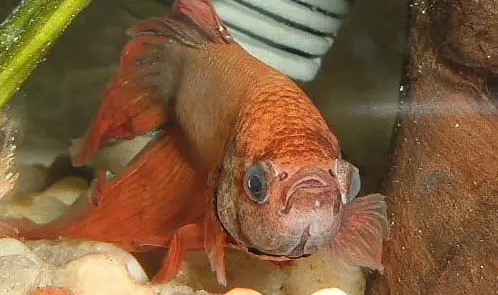Betta fish are a popular species of fish to keep as pets. They require little attention and maintenance, but there is one problem that many people have with them: eye bulging. In this blog post, we will look at the causes of bulging eyes in betta fish, the symptoms associated with it, and what you can do about it.
Why Does My Betta Have Bulging Eyes?
Your betta fish has popeye, which is caused by injury or bacterial infection. This occurs when the tissues around the eye swell, often leading to protrusion of the eyeball from the socket.
While there are a few potential causes, a bacterial infection is the most common. This can be the result of poor water quality, unclean living conditions, or a weak immune system.
I will now talk in-depth about the most common causes of bulging eyes in betta fish:
Betta Popeye from Injury
If your betta fish suffers an injury to the eye, it can lead to bulging eyes. This is because the injury causes inflammation and fluid accumulation in and around the eye. Potential injuries include:
- Fight wounds from another betta fish
- Injuries during transport, such as slamming into a hard surface or not being handled properly
- Accidentally swimming into a sharp object
How to treat betta eye injury?
If your betta fish has injured its eye, the first thing you should do is isolate it from other fish in case of infection. You will then need to provide antibiotics if there is an accompanying infection and anti-inflammatory medication if necessary.
You should then identify what causes the injury to your betta. It could be another betta fish, sharp objects in the aquarium (like gravel or decorations), or if your betta has accidentally swum into something.
How to prevent eye injury?
The best way to prevent eye injuries in betta fish is to provide a safe environment for them. This includes removing any sharp objects from the tank and ensuring that there are no other fish in the tank that could potentially harm your betta.
Plastic plants are a frequent cause of eye bulging. In fact, I prefer to use moss balls in my betta tank as they are much safer and provide lots of fun.
Betta is a territorial fish, so introducing another betta can cause stress and lead to injuries during the fighting. It’s also important to not handle your betta when not necessary, as this can cause injuries.
Betta Popeye from Bacterial Infection
Bacterial infection is the most common cause of bulging eyes in betta fish. The bacteria can enter the eye through a wound or by spreading from another part of the body. The most common types of bacteria that cause popeye are:
Pseudomonas aeruginosa – This bacterium is often found in soil and water, which can cause skin, eye, or respiratory infections in humans. It is also a common cause of fish popeye.
Enterobacter cloacae – This bacterium is found in the gut of animals and can cause urinary tract infections, sepsis (a potentially life-threatening condition), and pneumonia.
How to treat betta eye infection?
In order to treat a bacterial infection, you will usually need to provide antibiotics. This can be done by feeding the fish medicated food or adding medication to their water.
Additionally, make sure that there are no physical injuries to the eye that may have led to the infection. Here are the steps you should take if you think your betta has a bacterial infection:
- Relocate your fish into a separate quarantine tank
- Change all of the water in the main tank
- Treat your betta fish with a product specifically designed for bacterial infection in betta fish.
- Continue to change the water and add the treatment every few days.
- Be patient while your betta fish recovers. It can take up to a month for the infection and bulging eyes to clear, so be patient.
- Contains one (1) API MELAFIX Freshwater Fish Bacterial Infection Remedy 4-Ounce Bottle
- Heals bacterial infections and repairs damaged fins, ulcers and open wounds
- Contains natural, botanical tea tree extract to quickly and rapidly help fish
- Helps treat newly-introduced fish to reduce risk of disease outbreak in freshwater aquariums
- Use daily for a week when treating infections and for 3 days as a preventive when adding new fish
How to prevent betta eye infection?
The best way to prevent bacterial infections in betta fish is by ensuring good water quality. This means keeping the tank clean and changing the water regularly. You should also use a filter to help remove any toxins from the water.
The problem is that filters need to be regularly maintained to ensure that they are working properly. If the filter isn’t cleaned regularly, it can become a breeding ground for bacteria.
Once a month you should remove the filter and rinse it thoroughly. If you have a canister filter, the media should also be replaced every few months. This will help keep the water clean and free of bacteria.
In addition, you can also give your betta fish some medication to help prevent infection. There are a number of different medications available, so consult with your veterinarian to find the best one for your betta.
What Are The Symptoms Of Popeye In Bettas?
The most common symptom of popeye in bettas is bulging or protrusion of the eyes. Other symptoms can include cloudy eyes, excessive squinting, and inflammation.
Eyes popping out of the socket
One of the most alarming symptoms of popeye is when the eyes actually protrude from the socket. This is a clear sign that your betta fish is in serious trouble and needs immediate veterinary care.
Eyes changed color to grey or white
A change in the color of your betta’s eyes can be a sign that there is an underlying issue. The most common causes are injury to the eye or infection by bacteria or parasites. If you notice changes in the color of your betta fish’s eyes, consult your veterinarian immediately.
A white ring around the eyes
A white ring around the eyes can be a sign of a serious infection. The infection may have started in the eye itself or it may have spread from another part of the body. If you notice this symptom, take your betta fish to the veterinarian immediately for treatment.
Blindness
If your betta fish has lost its eyesight, it may be a sign of an underlying infection. Bacterial infections can cause blindness as the bacteria damage the eye itself. In this case, you will need to provide your betta with medication in order for him or her to heal and regain its eyesight.
General illness
If your betta fish is showing signs of illness other than popeye, such as lethargy or abnormal swimming behavior, it may be a sign that the eyes are affected. In this case, you will also need to take your fish to the veterinarian for diagnosis and treatment.

Betta Popeye FAQ
Popeye is a complicated issue. As such, you may have a few questions about it. Here are some of the most common ones that people ask:
Can popeye spread to my other bettas?
No, popeye is not contagious, so it will not spread to your other fish. However, there’s a good chance for other fish to get popeye if one of your fish already has it. This is because the bacteria that cause the infection can live in the water and spread to other fish.
Can betta popeye be prevented?
It is possible to prevent popeye by maintaining good water quality and avoiding injuries. However, even if you do everything right there is still a chance that your betta will develop this condition.
Will Melafix cure betta fish popeye?
There is no one-size-fits-all answer to this question. Some people have had success using Melafix to treat popeye, while others have not. You should consult with your veterinarian to see if this medication is right for your betta fish.
Can a betta fish recover from popeye?
Yes, a betta fish can recover from popeye. However, this will depend on the severity of the condition and how early it is caught. If you notice any changes in your betta’s eyesight or behavior, make an appointment with a veterinarian right away for treatment.
Can Epsom salt cure popeye in betta fish?
There is no scientific evidence that Epsom salt can cure popeye. However, many people have had success using this method to treat the condition. You should consult with your veterinarian to see if this is an option for your betta fish.
Conclusion
In conclusion, betta fish popeye is a serious condition that needs to be addressed by a veterinarian immediately. If you notice any of the symptoms described above, make an appointment with your local vet as soon as possible for diagnosis and treatment.
In order to prevent popeye from occurring in your betta fish, it’s important to maintain good water quality and avoid injuries. This condition can be treated, but it will depend on the severity of the condition and how early it is caught.







